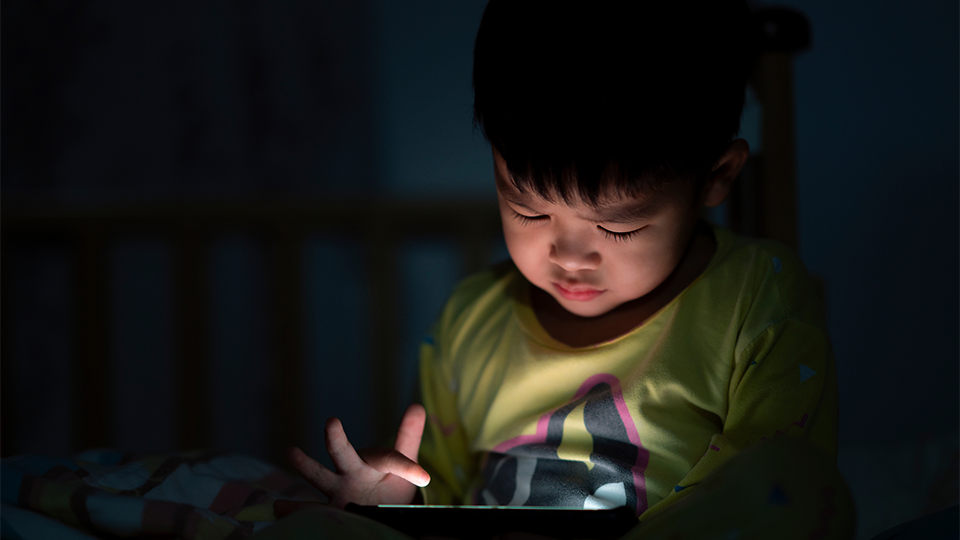Study: Infants exposed to excessive screen time show differences in brain function beyond eight years of age
Published: 31 Jan 2023

Caption: Young boy using the tablet computer. Copyright: anekoho
A longitudinal cohort study in Singapore which studied data from 506 children has confirmed that excessive screen time during infancy is linked to detrimental outcomes in cognitive functions, which continue to be apparent after eight years of age.
When these children were 12 months of age, parents were asked to report the average amount of screen time consumed on weekdays and weekends each week. The children were then classified into four groups based on screen time per day – less than one hour, one to two hours, two to four hours and more than four hours.
At 18 months of age, brain activity was also collected using electroencephalography (EEG), a highly sensitive tool which tracks changes in brain activity. Each child also participated in various cognitive ability tests that measured his or her attention span and executive functioning (sometimes referred to as self-regulation skills) at the age of nine years.
The team first examined the association between screen time and EEG brain activity. The EEG readings revealed that infants who were exposed to longer screen time had greater “low-frequency” waves, a state that correlated with lack of cognitive alertness.
To find out whether screen time and the changes observed in the brain activity have any adverse outcomes during later childhood, the research team analysed all the data across three points for the same children – at 12 months, 18 months and nine years. As the duration of screen time increased, the greater the altered brain activity and more cognitive deficits were measured. Children with executive function deficits often have difficulty controlling impulses or emotions, sustaining attention, following through multi-step instructions, and persisting in a hard task.
The brain of a child grows rapidly from the time of birth until early childhood. However, the part of the brain that controls executive functioning, or the prefrontal cortex, has a more protracted development. Executive functions include the ability to sustain attention, process information and regulate emotional states, all of which are essential for learning and school performance. The advantage of this slower growth in the prefrontal cortex is that the imbuing and shaping of executive function skills can happen across the school years until higher education. However, this same area of the brain responsible for executive functioning skills is also highly vulnerable to environmental influences over an extended period of time.
This study points to excessive screen time as one of the environmental influences that may interfere with executive function development. Prior research suggests that infants have trouble processing information on a two-dimensional screen.
When watching a screen, the infant is bombarded with a stream of fast-paced movements, ongoing blinking lights and scene changes, which require ample cognitive resources to make sense of and process. The brain becomes “overwhelmed” and is unable to leave adequate resources for itself to mature in cognitive skills such as executive functions. Professor Michael Meaney, Programme Director of the Translational Neuroscience Programme at SICS said, “In a country like Singapore, where parents work long hours and kids are exposed to frequent screen viewing, whether it is for school work or entertainment, it’s important to study and understand the impact of screen time on children’s developing brains.”
Researchers are also concerned that families which allow very young children to have hours of screen time often face additional challenges. These include stressors such as food or housing insecurity, and parental mood problems. More work needs to be done to understand reasons behind excessive screen time in young children, and to distinguish the direct association of infant screen use versus family factors that predispose early screen use on executive function impairments.
Lead author, Dr Evelyn Law from the Department of Paediatrics at NUS Medicine and SICS’s Translational Neuroscience Programme, said, “The study provides compelling evidence to existing studies that our children’s screen time needs to be closely monitored, particularly during early brain development.” Dr Law is also a Consultant in the Division of Development and Behavioural Paediatrics at the Khoo Teck Puat – National University Children’s Medical Institute, National University Hospital.
The study was a collaborative effort comprising researchers from the Yong Loo Lin School of Medicine, National University of Singapore (NUS Medicine), A*STAR’s Singapore Institute for Clinical Sciences (SICS), National Institute of Education, KK Women’s and Children’s Hospital, McGill University and Harvard Medical School.
The study was published in JAMA Paediatrics on 31 January 2023.
Read the press release here.
News Coverage
- “Screen time linked to impaired brain function, may affect learning beyond childhood: Study”, The Straits Times, 31 January 2023
- “本地研究:幼童看屏幕时间过多 影响大脑执行功能发展”, Lianhe Zaobao, 31 January 2023
- “Commentary: Infant Screen Time Spells Trouble in School”, Medscape, 30 January 2023
- “Study shows screen time in infancy can lead to behavioral problems later on”, CBS Boston, 30 January 2023
- “Your child’s academic success may start with their screen time as infants, study says”, CNN Health, 30 January 2023
- “Letting toddlers play with phones or tablets can lead to long-term brain disruptions”, Study Finds, 30 January 2023
- “askST: How to minimise harmful effects when giving your child screen time”, The Straits Times, 26 February 2023

